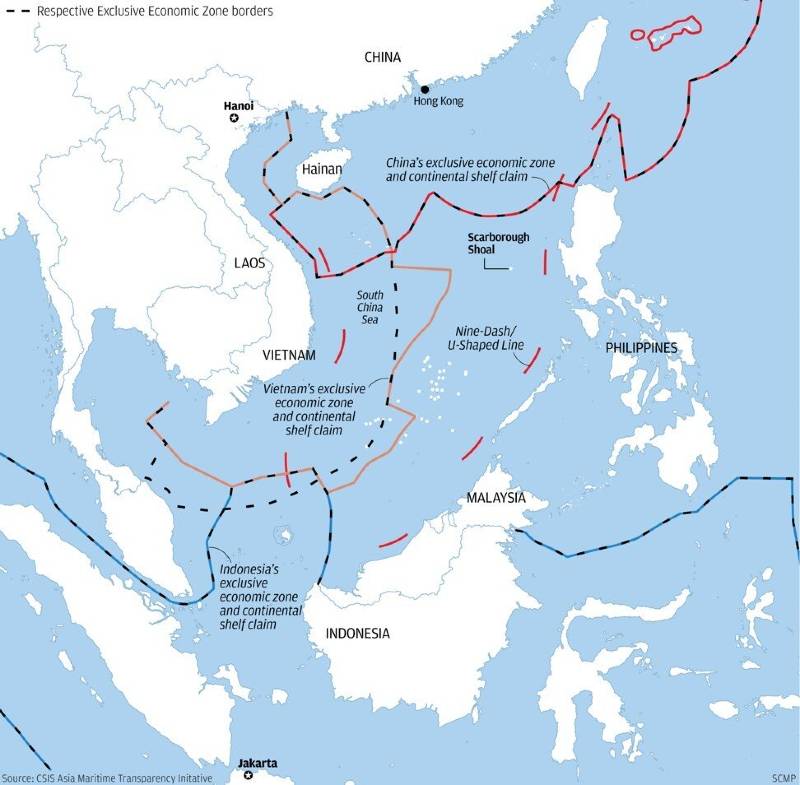-
Fishing groups in Vietnam and the Philippines have urged their governments to take firm measures to resist ban, which is intended to preserve fish stocks
-
Observers warn that food shortages caused by Covid-19 outbreak will increase risk of confrontation as countries move to protect domestic supplies.
Tensions are expected to rise in the South China Sea after Beijing’s annual summer ban on fishing in the disputed waters drew protests from rival claimants.
Related: Taiwan on alert as China steps up operations in the sea and skies around the island
China said it would prohibit fishing activities in the waters Beijing has claimed above the 12th parallel – including areas near the Scarborough Shoal, the Paracel Islands, and the Gulf of Tonkin – to conserve stocks.
The ban, which came into effect from noon on May 1 runs until August 16 and China’s coastguard has promised to take the “strictest measures” to stop any “illegal fishing activities”.
Fishing communities in Vietnam and the Philippines have urged their governments to take a strong stance and on Friday Vietnamese foreign ministry spokeswoman Le Thi Thu Hang said Hanoi rejected the “unilateral decision”.
“Vietnam asks China not to further complicate the situation in the South China Sea,” she said in a statement.
“Vietnamese fishermen have the complete rights to fish in waters under their sovereignty,” the Vietnam Fisheries’ Society said in a statement on its website early this week, adding that the ban violates international law and Vietnam’s sovereignty over the Paracel Islands.
In Manila, local fishery organisations also called on the Philippine government not to give in to “China’s bullying”.
“The Philippine government should not waste time and wait for Chinese maritime officers to arrest our fishermen,” said Fernando Hicap, chairman of the National Federation of Small Fisherfolk Organisations.
“They have no right and moral ascendancy to declare a fishing ban in the guise of conserving fish stocks in marine waters that they have no legal claim, and they have massively destroyed through reclamation activities.”

China’s claims are contested by several of its neighbours. Graphic: SCMP
Beijing claims 80 per cent of the South China Sea, which is contested by neighbouring countries, including Vietnam, the Philippines, Malaysia, Brunei and Indonesia.
China first introduced a seasonal ban in the waters in 1999, saying it would help sustain fishing resources in one of the world’s biggest fishing grounds.
The waters provide food and jobs for millions of peoples in surrounding countries but overfishing and climate change threaten their sustainability.
This year’s ban comes at a time of rising tensions over fishing rights and observers warned that any missteps could raise the risks of confrontation.
Last month, a Vietnamese fishing boat sank after colliding with a Chinese coastguard vessel near the Paracel Islands, known in China as the Xisha Islands and in Vietnam as the Hoang Sa archipelago.
China accused the fishing boat of ramming the coastguard vessel, but Vietnam blamed the Chinese vessel and lodged an official protest.
Citing satellite images, the South China Sea Probing Initiative, a think tank affiliated with Peking University, said that at least 379 Vietnamese vessels had been engaged in “illegal activities” off the Gulf of Tonkin and Guangdong and Hainan provinces last month, while 511 had done so in March.
Kang Lin, a research fellow with Hainan University, said Vietnamese fishing boats posed “a direct challenge” to China’s ban.
“They are not only challenging China’s sovereignty over the reefs and islets but also the [right of] jurisdiction over the waters,” Kang said.
“According to current trends, it is likely that Vietnamese fishing boats will step up their activities in the coming few months posing a challenge to China’s fishing ban.”
Kang said fishermen from other claimants, including the Philippines, are expected to follow suit.
In a rare show of solidarity, the Philippine foreign ministry also expressed concerns over the clash between the Vietnamese boat and the Chinese coastguard vessel.
The statement referred to a similar collision last year, when 22 Filipino fishermen were left in the water near Reef Bank after their boat sank before being rescued by a Vietnamese fishing boat.
Reporting by Laura Zhou
Laura Zhou joined the Post’s Beijing bureau in 2010. She covers China’s diplomatic relations and has reported on topics such as Sino-US relations, China-India disputes, and reactions to the North Korea nuclear crisis, as well as other general news.
